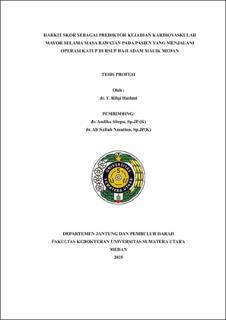| dc.description.abstract | Introduction: Valvular heart disease (VHD) remains a significant health issue in Indonesia, with high morbidity and mortality rates. Risk prediction systems such as EuroSCORE II are widely used globally but are deemed less suitable for the Indonesian population. The Harkit score, a locally developed prediction system, is claimed to be more relevant for predicting the risk of major cardiovascular events (MCE) during the hospitalization of post-VHD surgery patients. This study aims to evaluate the diagnostic accuracy of the Harkit score as a predictor of MCE at Adam Malik General Hospital, Medan.
Methods: This observational study utilized a retrospective design, focusing on the analysis of medical record data from patients undergoing heart valve surgery at Adam Malik General Hospital, Medan. Variables included in the Harkit score—such as NYHA status, hypertension, TAPSE function, and history of emergency surgery—were assessed for their association with MCE during hospitalization. Statistical analysis was performed to evaluate the relationship between the Harkit score and MCE risk and to determine the optimal predictive cut-off value.
Results: Among 161 patients analyzed, higher Harkit scores were observed in those who experienced MCE and mortality (P<0.05). Furthermore, the study demonstrated a relatively high diagnostic accuracy of the Harkit score for predicting MCE (sensitivity 70.8% and specificity 74.5%), as well as its association with mortality (sensitivity 76.19% and specificity 71.9%).
Conclusion: The Harkit score has been validated as a reliable and accurate tool for predicting MCE during hospitalization in post-VHD surgery patients at Adam Malik General Hospital, Medan. With its high sensitivity and specificity, the score shows great potential for clinical application in Indonesia, serving as an alternative to prediction systems less aligned with the characteristics of the local population. | en_US |


